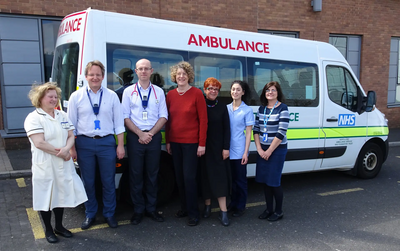From the front line - trying to protect the mental health of those working to keep us safe and healthy

Medicine is a stressful profession. It's what I tell potential medical students when they come for interview. I tell them they will have to cope with making mistakes, with looking after patients for whom there is little more they can do to help and with patients who die. They need mental resilience. But the last 6 months has been beyond anything any of us have had to deal with before, or could ever have imagined. And of course it's not just doctors who've been affected, but nurses, allied medical professionals, ambulance drivers, and staff in the community - in care homes, in domiciliary care and in public health. Staff who were already under pressure and over-stretched due to staff vacancies and increasing demand, having to work even harder, due to large numbers of COVID patients and colleagues off sick
I work as a Hospital Consultant treating patients with breast cancer. At the start of the pandemic, I had to review the notes of all my patients receiving chemotherapy or radiotherapy, to decide if it was safe to continue treatment. I had to balance the risks from a COVID infection against the risk that my decision might reduce their chances of cure or shorten survival. I then had to talk to the patients to explain the situation and, in some cases, having to point out that if they did become very sick, they might not be eligible for a ventilator. As you can imagine, those conversations were very difficult and stressful.
But in Newcastle we were very lucky. We went into lockdown in time to prevent the disease from overwhelming services. Very few cancer patients died from COVID infections and none of our hospital staff, but other parts of the country were not so lucky. I know of doctors and nurses in London, who had to care for friends and colleagues, then see them die. It must have been heart-breaking. Then there are the care staff who are themselves at risk - pregnant women, staff from a BAME background, those with diabetes who had to balance their duty of care to patients against the chance that they might put both themselves and their families at risk by continuing to work.
The mental health impacts for all staff will last a lifetime and experts are warning of high rates of post traumatic stress disorder. We must ensure health and care workers are supported throughout this crisis and beyond.
Some organisations are already taking up this challenge. The Trust I work for has acknowledged that the pandemic has created extra anxiety and stress for everyone and has launched a staff wellbeing page to provide a range of resources and information to help staff identify which mental and emotional support works best for them. They have also arranged talks on "Taking Care of Yourself and your Future" specifically designed to address various emotional, practical and psychological challenges, and help staff to pause, think and take control.
This type of support should be available for all health and care staff, so we need local Councils, hospitals, mental health trusts, CCGs, ambulance trusts, Care homes and domiciliary care providers to work with their staff to make sure high quality mental health support is available and easily accessed for all workers.
Cllr Dr Wendy Taylor was speaking to the Liberal Democrats Annual Conference on 25th September 2020
